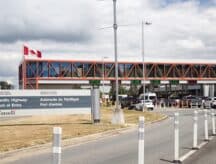What cannabis users need to know before travelling to Canada
Offences involving cannabis can have a serious impact on one's ability to enter Canada.
In 2018, Canada legalized buying and using recreational cannabis. While weed is now legal, it is also strictly regulated. Cannabis-related charges could potentially hurt a foreign national's ability to immigrate or travel to Canada.
Here are some of Canada's marijuana regulations, as well as some options for overcoming inadmissibility for cannabis users who have gotten in trouble with the law.
Click here to get a free consultation with the Law Firm of Campbell Cohen
Cannabis at the border
Transporting marijuana from Canada to another country — or to Canada from another country, remains illegal. This rule applies even if weed is legal in both the other country and Canada. The only exception is for recognized suppliers to whom the Canadian government issues a permit. These permits are available only for medical or scientific reasons.
In all other cases, travellers must declare and surrender the marijuana at the Canada border. A person cannot get around this ban by sending or receiving cannabis through the mail. Failure to comply with these rules risks punishments. These can include detainment, fines, and restrictions on one’s future ability to enter Canada.
Cannabis-impaired driving
The risks of driving while drunk or on drugs such as prescription medication are well known. However, many people are unaware of the risks of driving while high on marijuana.
Canada regards impaired driving, including driving while under the influence of weed, as a serious crime. The following are all criminal offences. Conviction may subject the offender to fines or prison time:
- driving, or having driven within two hours of, having more than 2 nano-grams of cannabis per mL in one’s blood;
- driving in a dangerous manner; and,
- refusing to comply with a roadside drug or alcohol test are all criminal offences.
Obtaining and using marijuana in Canada
In Canada, each province and territory sets the minimum age for cannabis use. Currently, it is 18 in Alberta, 21 in Quebec, and 19 in every other province or territory. It remains prohibited for underage individuals to access cannabis — or for adults to facilitate access.
Adults using cannabis must obtain it legally. This means they must get it from a store or supplier with a government licence. The maximum amount an individual can publicly possess is 30 grams of dried cannabis. As cannabis can come in other forms, the Canadian government has established a conversion method. For example, 1 gram of dried cannabis is equivalent to five grams of fresh cannabis. The Canadian government provides an online cannabis converter. This tool allows users to input and convert different amounts and kinds of marijuana to make sure they remain within the legal limit. You may access the calculator here.
Cannabis criminal histories
The Cannabis Act legalized certain previously illegal marijuana-related activities. This change’s impact extends to individuals outside Canada who may wish to travel to Canada. This is because Canada has strict rules for entry for people who have foreign criminal records. In such cases, Canada compares the foreign law with Canada’s own. If something is a crime in both countries, the person may have a problem. If the act is not a crime in Canada, there should generally be no issue.
Since public possession of up to 30 grams of dried cannabis (or equivalent) is now legal in Canada, a foreign criminal charge or conviction for mere possession of amounts up to this level should not pose a problem. However, if the person was charged or convicted outside Canada of acts that remain illegal in Canada, they may face hurdles entering. The nature, number, and date of their crime will determine if the individual is admissible or not.
Click here to get a free consultation with the Law Firm of Campbell Cohen
Overcoming inadmissibility
Generally, there are three paths to resolving inadmissibility:
Temporary Resident Permit (TRP): This document grants temporary access to Canada for someone who is otherwise criminally inadmissible. If the traveler is an American citizen or permanent resident, they can apply for a TRP at a Canadian consulate or border. A TRP might be valid for a single day, or for up to three years. It may be good for only a single entry to Canada, or it may allow multiple entries. These elements will depend on the purpose of the visit to Canada. Reviewing officers have considerable discretion when determining the validity period of a TRP. The purpose for entering Canada is usually the most important factor.
Criminal rehabilitation: Criminal rehabilitation gives permanent admissibility to someone who was formerly inadmissible. Eligibility depends on factors such as the crime committed, the sentence, and how much time has passed since sentence completion. If you have been convicted of a crime or crimes in a foreign country, and more than five years have passed since you finished your sentence, you are likely eligible to apply for Canadian criminal rehabilitation. Criminal rehabilitation is a one-time solution that, unlike a TRP, never requires renewal.
This process requires at least five years to have passed since completion of the sentence. This means that for some recent marijuana cases, TRP will be the only pathway for someone who wants to come to Canada. For example, if someone drove under the influence of weed after October 17, 2018, they are inadmissible to Canada on serious criminality grounds. Not enough time will have passed since the act or sentencing to be eligible for rehabilitation.
In short, just because weed is legal in Canada does not mean everyone who has ever had a cannabis-related charge can cross the border. However, for those who have, it does not necessarily mean the end of your Canadian dream.
Legal Opinion Letter: Another remedy to a potential Inadmissibility issue is a legal opinion letter, which is a document that a Canadian immigration lawyer prepares. It contains details concerning a past marijuana charge or conviction and the lawyer’s legal conclusion on the situation. The purpose of the letter is to identify relevant Canadian law and explain why the person should be deemed admissible to Canada. If you have been denied entry in the past due to a marijuana related conviction (such as possession of paraphernalia), have a recent charge or admitted marijuana use at a port of entry a legal opinion letter may be valuable for your next trip into Canada. A legal opinion letter can also be beneficial to those in a pre-sentencing situation prior to making a final plea. The letter can explain a direct equivalency of a particular cannabis-related crime into Canadian law.
Click here to get a free consultation with the Law Firm of Campbell Cohen
© CIC News All Rights Reserved. Discover your Canadian immigration options at CanadaVisa.com.
- Do you need Canadian immigration assistance? Contact the Contact Cohen Immigration Law firm by completing our form
- Send us your feedback or your non-legal assistance questions by emailing us at media@canadavisa.com







